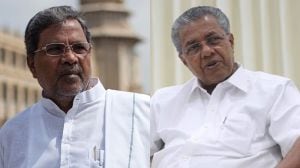Why Economic Survey argues for climate adaptation, not mitigation
The Economic Survey has pointed to flaws and inequities in the global climate action regime, and suggested alternative pathways that incorporate lifestyle and behavioural changes.
 Rain clouds in Mumbai on July 23. As the impacts of climate change worsen, extreme events such as floods and droughts are becoming increasingly common around the world, impacting large numbers of people. (Express photo by Pradip Das)
Rain clouds in Mumbai on July 23. As the impacts of climate change worsen, extreme events such as floods and droughts are becoming increasingly common around the world, impacting large numbers of people. (Express photo by Pradip Das)That the international framework for fighting climate change has been ineffective is evident from the fact that none of the targets set by it has ever been met. It is also well known that the system is highly inequitable. And yet, any suggestion of an alternative approach risks being seen as heresy.
The Economic Survey presented on Monday decided to risk it. Its two chapters on climate change were devoted almost entirely to pointing out the flaws and inequities in the system, and suggesting alternative pathways that incorporate, among other things, lifestyle and behavioural changes to reduce greenhouse gas emissions.
The Survey noted that the “excessive preoccupation” with meeting the 1.5- or 2-degree Celsius temperature target was putting impossible pressure on developing countries, forcing them to make choices they were not ready for, and diverting their focus and resources away from the more near-term imperatives of improving the lives of their people.
It went so far as to suggest that it was possible to imagine a warmer world that was more equitable and resilient than a world in which the 1.5-degree threshold was achieved at all costs.
The Economic Survey does not deny climate change. These arguments are not new, and already have wide resonance in the developing world. Just that these views would be expressed in informal groups behind closed doors, and not in a policy document of the government. It is not clear though whether the Economic Survey was making an academic argument, or signalling of possible shift in India’s energy transition trajectory.
Increasing resilience
In essence, the Economic Survey’s argument is that adaptation should get at least as much importance as mitigation — more so because the impacts of climate change are already unfolding, and it is becoming increasingly clear that the 1.5-degree target will be breached very soon, no matter what the world does (or not) in response. In this situation, rapid improvement in incomes and overall well-being of the people is the best insurance against climate change.
It is important to understand that while there is near consensus in the scientific community that the frequency and intensity of climate impacts increase with rise in temperature, the 1.5- or 2-degree thresholds are chosen arbitrarily — they are not natural thresholds for climate change. There are no climate impacts that get triggered only after these limits are crossed, and not before.
To those who do not subscribe to the doomsday view that climate change would destroy the world in a few years, the argument of the developing countries will make sense. Since climate impacts cannot be stopped, the world must focus on rapid development and adaptation to increase resilience, especially among communities that are at the greatest risk.
The counter-argument: at these higher temperatures, the ferocity of climate impacts would increase so much that incremental improvements in resilience would be rendered useless.
Indeed, there are uncertainties on both sides. It is in this context that it is sometimes proposed that the rich and developed countries do the mitigation work while developing countries focus on adaptation. But this is easier said than done.
Inequities and hypocrisy
The Economic Survey articulates the impatience of developing countries with the developed world’s hypocrisy. The United States has the largest historical responsibility, but has been the biggest laggard on emissions reductions. Its 2019 emissions were about 6% higher than in 1990, and is even now only marginally lower. The developed countries as a bloc have not fulfilled any of their emission reduction targets, or their commitments to provide finance or technology to the developing countries.
The responsibility for these failures have been sought to be passed on to the rest of the world in the form of calls for enhanced climate action. In fact, the international climate architecture has always been less about saving the planet from the consequences of climate change and more about preserving the existing world order. It has become the vehicle to perpetuate the dominance of the rich and industrialised world by mandating transitions that are more suited to them.
If it was just about climate, there would have been no need to junk the Kyoto Protocol which was far more equitable and effective to deal with climate change. But the process to dismantle the Kyoto Protocol — and replace it with something more suitable (eventually the Paris Agreement) — began immediately after it came into effect. The developed countries realised quickly that Kyoto had the potential to challenge — or at least make it difficult to perpetuate — the prevailing global order.
Scientific organisations such as the Intergovernmental Panel on Climate Change (IPCC) have strengthened the narrative of the developed countries. Even as it became increasingly clear that the 1.5-degree target would be breached, almost every scientific assessment continued to present scenarios that showed that it was still possible to achieve the target, if only more effort was made. These scenarios may be plausible in theory, but are completely unrealistic given the countries’ track record. But each such report is followed by calls for greater action, which translates into enhanced pressure on the developing countries.
Recent work by Tejal Kanitkar, an assistant professor at the Tata Institute of Social Sciences, and her colleagues has shown how inequities and biases were built into the models used by the IPCC to draw up climate scenarios. Their studies have shown that the most recent IPCC assessment had disregarded both the historical responsibility of the developed countries and the future energy requirements of the developing nations.
Alternative approaches
The Economic Survey’s criticism of the established order on climate change needs to be followed up by effective action.
📌 While building its infrastructure, India could make it among the most climate resilient in the world. But this does not seem to be happening at the fastest pace and largest scale that is possible. The Central Vista, for example, will be a huge improvement over the current set of buildings in the Central Secretariat complex, but it remains to be seen if it will be the best model for futuristic building.
📌 The Smart City plans that were begun nine years ago contain several elements of climate proofing, but most of these cities are still struggling with managing their sewage.
📌 The railways stations that are being built are likely to be far better than the existing ones. But they will not be the world’s most climate-friendly stations.
📌 India has been offering Mission Life — which calls for lifestyle and behavioural changes — as a key ingredient of its climate change strategy, but it is still to become a mass movement. Pointing to over-consumptive lifestyles of the developed world has limited use when the rich in India indulge in similar over-consumption.
- 01
- 02
- 03
- 04
- 05






































